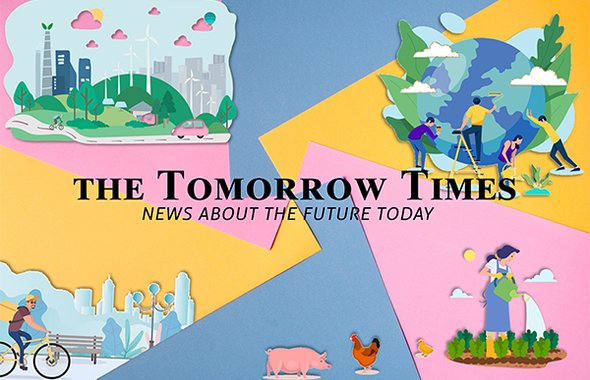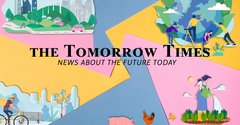
the Tomorrow Times - June‘21
News > News about the future today
This month's news gives a glimpse into systemic change, with a focus on sustainable living. From the limelight of co-living, to new research about eco-wakening, including the contribution of young Rwandan innovators to transform plastics into circular building materials and regenerative cities which contribute to ecosystems’ restoration - these are all hints for a better future. Most importantly, they show us that change is possible.
Stay curious, keep up to date, and get inspired, all in a quick read.
The UN World Environment Day reminded us that solutions to restore ecosystems are possible and it requires us to “Reimagine, Recreate and Restore”. The time is ripe for visions that go beyond single-issue solutions, that address an essential change in the foundations of how we live, work, produce, play, and prosper. System thinking is the key to transforming our society from exploiting nature into a symbiotic relationship; one where the prosperity of humans coincides with the thriving of the natural world. At Except, we developed a blueprint for a fully self-sustaining city, where all daily needs are met, including social, environmental, financial, and material. An open city, in full interaction with the rest of the world, yet that functions fundamentally differently - Orchid City.
Except will present Orchid City together with their partners via an online event on Thursday June 24th, 2021 at 16:00 (CET). Register on Linkedin or Facebook.
Follow these periodical monthly updates of tomorrow’s sustainability news today, by subscribing to the Tomorrow Times.
Energy & Environment

- Still time to reverse damage to ecosystems, declares UN chief, marking World Environment Day. Amidst the triple environmental threat of biodiversity loss, climate disruption and escalating pollution, Secretary-General António Guterres launched “an unprecedented effort to heal the Earth”, on the eve of World Environment Day, marked by the motto REIMAGINE, RECREATE, RESTORE.
- Holistic solutions needed to increase countries' biocapacity. 70% of people live in countries without enough ability to regenerate the resources that people use. The biosphere cannot recover quick enough. Additionally, we seem not to have learned during the COVID pandemic, as it looks like demand for resources is back to levels as before the pandemic. Another reminder of the need of steering towards systemic change, towards a sustainable society, by developing highly efficient and self-sustained environments.
- Is plastic recycling enough? Plastic is a material, a means to a purpose, and it is up to us to define what that purpose is. The properties of plastic are often unparalleled, and we can still make use of them if we eliminate unnecessary plastic and innovate products to be durable and reusable. Reusable versions of products from Nestle, Procter & Gamble, Kroger, Walgreens, and hundreds of other retailers are being, or will in the future be, made available to consumers.
Business & Economy

- Co-living is gaining momentum. LifeX is a Danish startup that believes in beautiful coliving homes for young professionals. Enabling individuals to experience hassle-free and flexible living, while reducing their environmental impact by sharing facilities. Currently operating in six European countries, LifeX has announced its expansion into the Belgian market, and two new property partnerships.
- The global eco-wakening: how consumers are driving sustainability. New research shows support for sustainable business is growing in both developed and developing economies. Many consumers believe brands bear as much responsibility for positive change as governments, and that businesses must commit to protecting nature and natural systems.
- Are sustainable startups killing their growth with numbers? An often more present new problem is too much information. Too much data causes the audience to lose sight of key information, a fact also known as ‘cognitive overload’. In the digital information age, data collection is no longer a problem. The real problem is to convert data multitudes into data synthesis. Information that reveals points of strengths, weaknesses, and how to behave to boost sustainable innovations.
Science, Technology & Design

- Rwanda’s young innovators are building a circular economy. Rosette Muhoza had the idea of melting down plastic trash from around Kigali and fusing it with sand. Resulting in a durable substance - ideal for paving and construction projects around the capital. The concept has won the UNICEF competition and the UK Commonwealth Innovation Award.
- The human genome has finally been completely sequenced after 20 years. When scientists first announced that they had read all of a person’s DNA 20 years ago, they were still missing some bits. Now, with the benefit of far better methods for reading DNA, it has finally been possible to read the whole thing from end to end.
- The untapped potential of wood. Using wood in our buildings and bridges could save 31% of global CO2 emissions. Here are some surprising examples of some cutting edge innovations which make use of wood.
Urban Environment

- Ecosystem restoration playbook. Our cities can be reimagined as hubs for biodiversity, conservation, and climate resilience. The 5th of June marked the launch of the UN Decade on Ecosystem Restoration, which serves as a reminder that we must mobilize urban decision-makers and citizens to put nature at the heart of urban life. UNEP has published a practical guide to ecosystem restoration that provides an introduction to the range of actions that can slow and halt the degradation of ecosystems and foster their recovery. See also the UN virtual Launch Gala.
- The benefit of ‘slow cities’. A great paradox of modern times is that the faster we go, the less time we have. More time can be saved by slowing city transport than by speeding it up. Embracing the ‘slow city’ vision requires a new vision for the city. As Carlos Pardo asked in his presentation at UN Habitat in 2017: “Why don’t we start thinking about speed as a problem rather than as a solution?” Many cities are doing just that.
- Cities designed to create health equitably and sustainably. 4 ingredients to health-proof and climate-proof future cities.
Unexpected and Intriguing

- Some good news from the blue planet. When it comes to water, it’s hard not to think of catastrophes: drought, overfishing, water wars. But on closer examination, there’s some surprisingly good news out there in the world of water, as this new DW documentary shows us.
- Whale’s skeleton hundreds of miles from the sea. The unexpected discovery of a whale skeleton hundreds of miles from the sea and more than 60 meters above sea level in 1849 is a reminder of how much sea level can change.
- 14.7 Million-year-old tropical rainforest unveils an extraordinary species diversity. Approximately 25,000 fossil-containing amber samples and about 5,000 fossil plants collected in Zhangpu County, southeast China from 2010 to 2019, reveal that extraordinary species diversity existed, and shed light on the evolution of the rainforest.
- Reimagine, Recreate, Restore – World Environment Day Poem by Jordan Sanchez.
Have you seen a news item suited for 'the Tomorrow Times'? Let us know and we'll consider including it in the next edition.
Previous Tomorrow Times editions
Find all Tomorrow Times editions and newsletters here.
Media & Downloads
Author
Luca Gennari
Environmental Engineering Consultant
 +31 10 7370215
+31 10 7370215


